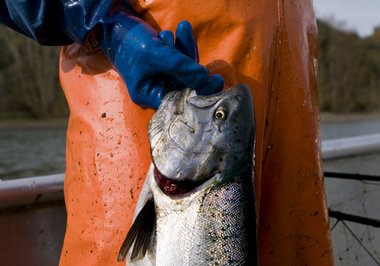forum
library
tutorial
contact

Oregon Poised to Adopt the Strictest Standard
for Toxic Water Pollution in the U.S.
by Scott LearnThe Oregonian, January 6, 2011
|
the film forum library tutorial contact |

|
Oregon Poised to Adopt the Strictest Standard
by Scott Learn |
 Oregon is poised to adopt the strictest standard for toxic water pollution in the United States, driven by concerns about tribal members and others who eat large amounts of contaminated fish.
Oregon is poised to adopt the strictest standard for toxic water pollution in the United States, driven by concerns about tribal members and others who eat large amounts of contaminated fish.
The Department of Environmental Quality proposed the new standard Thursday, nearly two decades after concerns about contamination in fish prompted studies that showed tribal members along the Columbia River eat far more fish than the general population.
The new rule, scheduled for approval in June, would dramatically tighten human health criteria for a host of pollutants, including mercury, flame retardants, PCBs, dioxins, plasticizers and pesticides.
Industry and cities worry about the costs of complying with the new rules and controlling pollution, likely to run in the millions.
"There are potentially a lot of manufacturing jobs being put at risk," said John Ledger, an Associated Oregon Industries vice president. "It could put (businesses) in a terrible position, where they can't locate here or expand."
Environmental groups say the change is long overdue, but exceptions built into the proposed rules and a lack of focus on pollution from farms, timberlands and urban stormwater mean they might not reduce pollution significantly.
"We can change standards on paper, but how it plays out on the ground and whether we're really ratcheting down pollution is what matters," said Brett VandenHeuvel, Columbia Riverkeeper's executive director.
The proposal presses some big hot buttons: regulating industry in a down economy; DEQ's authority over farms and forests; protecting tribal members who have seen their health compromised and their traditional diet degraded by pollution.
Oregon's current water quality standard is built on an assumption that people eat 17.5 grams of fish a day, about a cracker's worth. The proposed standard boosts that to 175 grams a day, just shy of an 8-ounce meal.
That could boost cost for industry such as paper mills and for sewage treatment plants, increasing rates.
It could also lower the health risks for those who eat a lot of local fish -- an estimated 100,000 Oregonians, including 20,000 children, according to a committee set up to consider the health effects of the new standard.
Two years ago, sewage treatment and business groups predicted millions in costs for industry and potentially billions for sewage treatment plants if they had to install state-of-the-art treatment systems.
A more recent study commissioned by DEQ came up with much lower estimates, about $400,000 a year in incremental compliance costs statewide. DEQ officials say they've built in a variance to make sure polluters can cut releases over time at a reasonable cost.
Measures could include public education campaigns, implementing "best management practices" to reduce pollution and pursuing sewer users who put pollution into sewer systems.
Janet Gillaspie, executive director of the Oregon Association of Clean Water Agencies, said she thinks DEQ has underestimated the impact of the changes, including the costs and paperwork necessary to comply with the new rule.
Kathryn VanNatta, governmental affairs manager for the Northwest Pulp and Paper Association, said variances are likely to be hard to get: "Oregon has never issued a variance," she said, "and this proposal does not make a variance any easier."
The variance provision could also be modified by the U.S. Environmental Protection Agency, which has to approve the new standard, or challenged in court, business advocates warn.
Environmental groups, including some that have filed lawsuits over implementation of the federal Clean Water Act in Oregon, say the proposal doesn't go far enough.
Variances and other exemptions could water down the rules to the point "there may not be much there," said Nina Bell, executive director of Northwest Environmental Advocates.
The proposal is out for public comment through Feb. 18, with seven hearings scheduled statewide Feb. 1-10. Oregon's Environmental Quality Commission is scheduled to approve a final standard in June.
The Confederated Tribes of the Umatilla Indian Reservation led the move for a tougher standard. Carl Merkle, acting manager of the tribes' environmental rights and protection program, said he's still evaluating the draft.
"We don't want to see exceptions swallowing up the rule," Merkle said. "But we also understand that, for some dischargers, meeting these heightened standards is not going to happen overnight."
learn more on topics covered in the film
see the video
read the script
learn the songs
discussion forum
